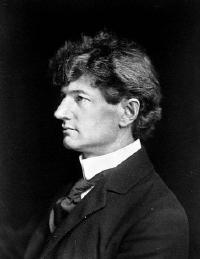Bliss Carman Society

Photo: famouspoetsandpoems.com
The history of the Bliss Carman Society owes much to the role that Alfred Bailey performed in its initiation. Upon returning to Fredericton and the University of New Brunswick (UNB) in 1938 as a professor of history, Bailey began the process of assessing and reinvigorating the literary community of both the university and the city of Fredericton. Bailey remains one of Canada's most established and celebrated historians and poets, championing the cause of poetry throughout his career. He helped found the Department of History at UNB, professionalised the library, and established provisions for housing substantial archival materials at the university.
In his 1985 interview with fellow poet M. Travis Lane, Bailey discusses his return from Saint John and how he “thought to revive the literary movement here” (244), a sentiment that would provide impetus for the creation of the Bliss Carman Society. Robert Gibbs, writing in A Literary and Linguistic History of New Brunswick, states that this society “was modelled on an association Bailey had in Toronto with other young poets, who met weekly to discuss their work and to set themselves exercises and experiments” (126).
Initially conceived as a loose group of friends or guests, founding members of the society such as Dorothy How and Linden Peebles would meet monthly at Bailey's house to share ideas on poetry, critique one another's work, and practice verse. Bailey's foreword to the collected minutes of this society, which are available in the UNB archives, acts as a statement of intent or mission for the society. There, Bailey acknowledges Fredericton's rich history of poetry, asserting that “The Bliss Carman Society was founded in December, 1940, in the belief that this tradition is worth preserving and continuing” (1). Bailey makes the important observation that the society would not serve to slavishly imitate the existing canon, but to experiment to the point of contemporaneity. He cites T.S. Eliot's maxim that the poet can only excel through training and workmanship, indicating the role that this society would play in offering a developmental experience. In his interview with Lane, Bailey further states that they “would listen to each other and criticize each other as constructively as possible” (245). To some degree, the society operated as a precursor to now-ubiquitous creative writing workshops in which the idea of a shared responsibility in the production of poetry is central to the ethos of the group.
In an attempt to structure their early sessions and anchor the group in commonly experienced poetic practice, Bailey introduced exercises in versification. The minutes give a fascinating insight into this practice, which included such tasks as writing a sonnet on the subject of knowledge with “end rhymes provided” (3), or writing a formless poem centred on the idea of “Crowned” (6). The results of these exercises are as varied as one might expect, attesting to the role that the society played in helping to develop individual poetic voices and offer an outlet for creative process in the community. As to the latter, invitations were only extended to Bailey's colleagues and acquaintances from the local area, with the somewhat odd caveat that the society would not number more than seven. There is no explanation for this rule in the minutes, although one might speculate that it was enforced to maintain the logistical efficiency of the workshop experience, where too many voices might compromise efficiency. From the interview with Lane, we learn that the practice of exercises continued for approximately five years, ceasing gradually as the group developed. Bailey himself stopped hosting the meetings after six or seven years, during which time (1945 onwards) the Bliss Carman Society's greatest legacy was born: The Fiddlehead.
The Fiddlehead is now an internationally recognised journal of literature, the oldest continually running magazine of its kind in Canada, but its inception came about as a direct extension of the work of the Bliss Carman Society. Bailey had kept minutes of the society meetings from the start, fuelling requests from members for copies of the mimeographed poems. Eventually, this collection was given a cover and the name “Fiddlehead,” selected by Bailey himself. For several years, until the early 1950s, the magazine essentially operated as a “minute book” (Gibbs 126) for the society, with poems being chosen from those discussed at meetings and published as a personal testament to their development. Only under the editorship of Fred Cogswell (1952–1966) did the magazine open its arms to submissions from Canadian (1953) and, eventually, international contributors. This helped cement The Fiddlehead’s role as a forerunner in the development of Canadian magazines as a critically appreciated and creatively vibrant body of work.
The role that the Bliss Carman Society performed under the dynamic and intelligent guidance of Bailey was a crucial one in the history of New Brunswick literature. It focussed the minds of a group of writers who might otherwise have struggled without the receptive and constructively critical environment that their meetings provided. This, in turn, paved the way for Fredericton and UNB to act as a site of poetic invigoration once more (as it had during the time of the Confederation Poets), drawing writers such as Robert Gibbs and Cogswell to the city and allowing The Fiddlehead to flourish into the internationally acclaimed journal that it is today.
Benjamin Griffin, Spring 2009
University of New Brunswick
Bibliography of Secondary Sources
Bailey, A.G. Foreword. Minutes of the Bliss Carman Society of Fredericton, founded December, 1940. ms. PS8455.A72 Z512. Original collection of a mimeographed record of the work of the members of the society. Harriet Irving Library, UNB, Fredericton.
Gibbs, Robert. “English Poetry in New Brunswick 1940–1982.” A Literary and Linguistic History of New Brunswick. Ed. Reavley Gair et al. Fredericton, NB: Goose Lane Editions, 1985. 125-45.
Lane, Travis. M. “An Interview with Alfred Goldsworth Bailey.” Studies in Canadian Literature 11.2 (1986): 226-46.
Lynch, Gerald., ed. Bliss Carman: A Reappraisal. Ottawa: U of Ottawa P, 1990.


